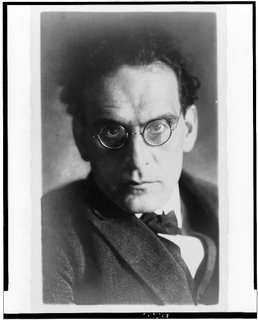Godwin's Law, it seems, holds sway every bit as strongly on the operatic stage as elsewhere. The Santa Fe Opera's new production of
The Magic Flute starts out as a pretty humdrum affair — director Tim Albery trots out the old "universal message" dodge one more time, presenting the characters as everything from contemporary Americans (Papageno) to 18th-century Brits (Sarastro and his boys).
But then Monostatos and his henchmen show up as Nazi officers, replete with overcoats, jackboots and leather caps, and the whole thing turns ugly. It takes an odd kind of blindness not to recognize that the kind of evil represented, respectively, by Monostatos and Hermann Göring are, let us say, incommensurate *. The cartoonishness of the former is amply demonstrated by the ease with which Papageno's magic bells carry the day, and that is a moment that, done properly, should always elicit a welcome laugh. Here Papageno brandishes the bells with a Luger leveled at his head — a vile stage image.
On a far less serious level, I also take mild umbrage at the presentation of the Queen of the Night in the person of Elizabeth I (
Best. Monarch. Ever.), and although the decision to keep Pamina in a nondescript nightie almost throughout the performance presumably reflects her uncertain allegiances, it looks damned silly.
Musically, Monday's performance hovered within that familiar zone between "okie-dokie" and "not too bad", with only Natalie Dessay's radiant and dark-hued Pamina to bring a touch of splendor to the proceedings. William Lacey's conducting was brisk but not crisp, which made things seem more rushed than fleet of foot.
There was one nice moment, though, that seemed obvious in retrospect. At the beginning of the Act I Quintet, when Papageno still has his mouth locked shut, baritone Joshua Hopkins didn't sing the usual "mmm-mmm-mmm-mmm" that is (I think) in the score. Instead, he sang as if he could
almost get the words out — you could hear a distinct variety of muffled phonemes but no actual words. It made a big difference.
* OK, I can actually get from
The Magic Flute to cartoon Nazis in one step; but let's not make a habit of it.





